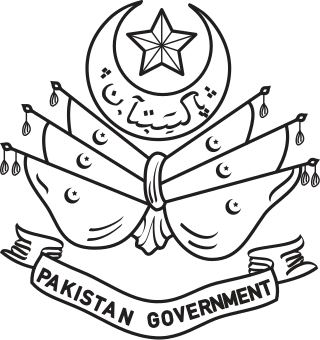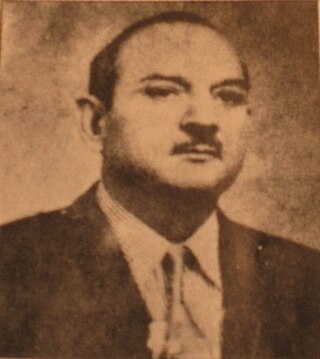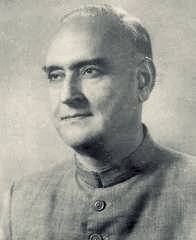
Sir Khawaja Nazimuddin was a Pakistani politician and statesman who served as the second governor-general of Pakistan from 1948 to 1951, and later as the second prime minister of Pakistan from 1951 to 1953.

Nurul Amin was a Pakistani politician and jurist who served as the eighth prime minister of Pakistan from 7 December to 20 December 1971. His term of only 13 days as prime minister was the shortest served in Pakistani parliamentary history. He was also the only Vice President of Pakistan.

Sir Malik Ghulam Muhammad was a Pakistani politician and economist who served as the third governor-general of Pakistan from 1951 to 1955.

Syed Mohammad Ali Chowdhury Bogra was a Pakistani Bengali politician, statesman, and a diplomat who served as third prime minister of Pakistan from 1953 to 1955. He was appointed in this capacity in 1953 until he stepped down in 1955 in favour of Finance Minister Muhammad Ali.

The Parliament of Pakistan is the supreme legislative body of the Islamic Republic of Pakistan. It is a bicameral federal legislature, composed of the President of Pakistan and two houses: the Senate and the National Assembly. The president, as head of the legislature, has the power to summon or prorogue either house of the Parliament. The president can dissolve the National Assembly, only on the Prime Minister's advice.

Alvin Robert Cornelius, H.Pk was a Pakistani jurist, legal philosopher and judge, serving as the 4th Chief Justice of Pakistan from 1960 until 1968. In addition, he served as Law Minister in the cabinet of Yahya Khan, 1969 – 16 December 1971.

The Constituent Assembly of Pakistan was established in August 1947 to frame a constitution for Pakistan. It also served as its first interim parliament. It was dissolved by the Governor-General of Pakistan in 1958.

East Bengal was the eastern province of the Dominion of Pakistan, which covered the territory of modern-day Bangladesh. It consisted of the eastern portion of the Bengal region, and existed from 1947 until 1955, when it was renamed as East Pakistan. East Bengal had a coastline along the Bay of Bengal to the south, and bordered India to the north, west, and east and shared a small border with Burma to the southeast. It was situated near, but did not share a border with Nepal, Tibet, the Kingdom of Bhutan and the Kingdom of Sikkim. Its capital was Dacca, now known as Dhaka.
Muhammad Munir was the second Chief Justice of Pakistan serving from 1954 to 1960.
Events from the year 1951 in Pakistan.

Naseer Ahmad Malhi was a Pakistani politician, known for playing a pivotal role in the formation of the Islamic Republic of Pakistan. Malhi is recognised as one of the nation's activists of the Pakistan Movement.
The doctrine of necessity is the basis on which extraordinary actions by administrative authority, which are designed to restore order or uphold fundamental constitutional principles, are considered to be lawful even if such an action contravenes established constitution, laws, norms, or conventions. The maxim on which the doctrine is based originated in the writings of the medieval jurist Henry de Bracton, and similar justifications for this kind of extra-legal action have been advanced by more recent legal authorities, including William Blackstone.

The history of East Bengal and East Pakistan from 1947 to 1971 covers the period of Bangladesh's history between its independence as a part of Pakistan from British colonial rule in 1947 to its independence from Pakistan in 1971.

The Muslim League was the original successor of the All-India Muslim League that led the Pakistan Movement to achieve an independent nation. Five of the country's Prime Ministers have been affiliated with this party, namely Liaquat Ali Khan, Khwaja Nazimuddin, Mohammad Ali Bogra, Chaudhry Muhammad Ali, and Ibrahim Ismail Chundrigar. The Muslim League was defeated in the 1955 elections to the Constituent Assembly by a political alliance known as the United Front. However, Prime Minister Chaudhry Mohammad Ali and later Prime Minister Ibrahim Ismail Chundrigar were appointed to lead a minority government. The party was dissolved in 1958 after the declaration of Martial Law by General Muhammad Ayub Khan, the Commander-in-Chief of Pakistan Army.

Military coups in Pakistan began in 1958 when military officer Muhammad Ayub Khan overthrew and exiled president Iskandar Ali Mirza. Since its creation in 1947, Pakistan has spent several decades under military rule. After their respective terms in office, each of the past five prime ministers of Pakistan has faced convictions or imprisonment. This trend highlights a significant aspect of Pakistan's political landscape: the prevailing rule that the Pakistani military exercises influence wherever it deems necessary, often persisting despite potential repercussions. Throughout Pakistani history, the military has played a prominent role in governance, with periods where it has directly ruled the country.

From 1947 to 1956, the Dominion of Pakistan was a self-governing country within the Commonwealth of Nations that shared a monarch with the United Kingdom and the other Dominions of the Commonwealth. The monarch's constitutional roles in Pakistan were mostly delegated to a vice-regal representative, the governor-general of Pakistan.

Mahmud Husain Khan was a Pakistani historian, educationist, and politician, known for his role in the Pakistan Movement, and for pioneering the study of social sciences. He served as Minister for Kashmir Affairs from 1951 to 1953 and Minister for Education in 1953, as well as minister of state in Pakistan's first cabinet under Prime Minister Liaquat Ali Khan.
Federation of Pakistan v. Maulvi Tamizuddin Khan (1955) was a court case of the Dominion of Pakistan. The Federal Court of Pakistan ruled in favor of the Governor General of Pakistan's dismissal of the 1st Constituent Assembly of Pakistan. The dismissal was legally challenged by Maulvi Tamizuddin Khan, the president of the assembly. Except one dissenting opinion, the majority of the court supported the dismissal on grounds of the doctrine of necessity. The verdict was considered a blow to democratic norms, which had ramifications in modern-day Pakistan and Bangladesh, and led to the dismissal being described as a constitutional coup.

The Liaquat Ali Khan government, commonly abbreviated as the L.A Khan government or Ali Khan administration was the first government and cabinet of Pakistan which ruled from 1947 to 1951, and was led by Liaquat Ali Khan.















